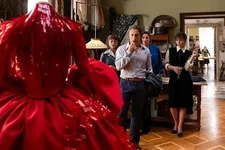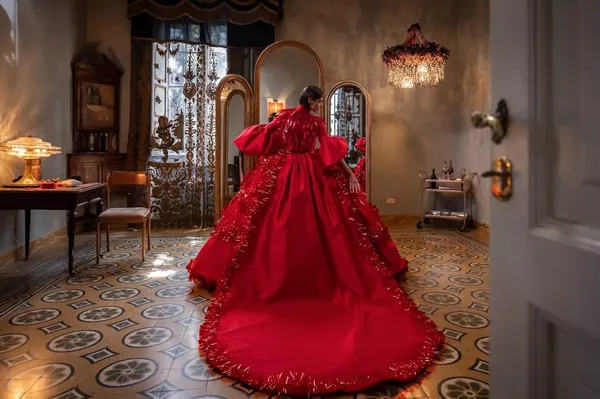 |
| Ferzan Özpetek, the director of Diamonds (Diamanti):”There are certain costume designers I was thinking of, Milena Canonero, yes. Piero Tosi who was a good friend …” |
Ferzan Özpetek’s sparkling Diamonds (Diamanti, a highlight of Cinecittà and Film at Lincoln Center’s 24th edition of Open Roads: New Italian Cinema) almost entirely takes place in a Roman film and theater costume atelier in the 1970s, owned by Alberta Canova (Luisa Ranieri) and her sister Gabriella (Jasmine Trinca), who after a personal loss seems more and more out of sorts to handle all the detailed requirements requested by demanding costume designers, movie directors, and stars.
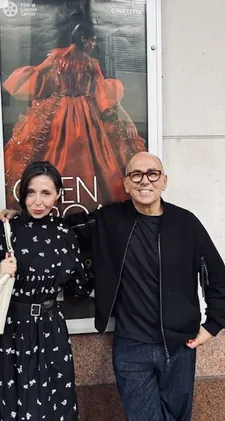 |
| Ferzan Özpetek with Anne-Katrin Titze about his encounter with Monica Vitti: ”She turned around and came back to me and said, you are going to make a lot of beautiful films!” |
The fabulous ensemble cast (including Sara Bosi, Loredana Cannata, Geppi Cucciari, Anna Ferzetti, Aurora Giovinazzo, Nicole Grimaudo, Milena Mancini, Vinicio Marchioni, Paola Minaccioni, Carmine Recano, Elena Sofia Ricci, Lunetta Savino, Vanessa Scalera, Carla Signoris, Kasia Smutniak, Mara Venier, Giselda Volodi and Milena Vukotic) sheds light on the various concerns of women in the garment business and their personal relationships through humorous and sometimes almost tragic vignettes.
The great Piero Tosi, Visconti’s go-to costume designer for sumptuous masterworks like The Leopard, Death In Venice, and Ludwig inspired Özpetek’s vision. The fantastic Milena Canonero (The Shining, Out Of Africa, most of Wes Anderson’s films, including his latest, The Phoenician Scheme), who ended up winning the first of her four costume design Oscars for Barry Lyndon after Tosi recommended her to Kubrick, may come to mind as a possible role model for a challenging perfectionist customer at the center of the atelier’s hustle and bustle.
Classic movies, such as George Cukor’s The Women, share some of Diamonds’ exuberance and lighting two cigarettes always resurrects the image of Bette Davis and Paul Henreid in Now, Voyager. A wheelchair moment and a missed appointment spell out Leo McCarey’s An Affair To Remember and putting on cold cream might be one of the most cinematic acts, but Özpetek creates his very own entertaining melee, filled to the brim with Pucci scarves, Sunset Boulevard entrances, buttons and bows, and enough food to feed the cast and crew of five movies.
Anne-Katrin Titze: There are a lot of women in your film, but not only. I was still reminded of George Cukor’s The Women.
Ferzan Özpetek: Ha! You know, I love George Cukor but it’s very difficult to arrive at the thinking of George Cukor. He made The Women only with women.
AKT: Right.
FÖ: Wonderful movie. There are many movies with only women, for example I love the movie Steel Magnolias. I started to think about it ten years ago to make a film with only women, with my actresses, because in life I have very good, very different relationships with women, more than men. In the movies I have more good relationships with my actresses and I said now is the moment to make it!
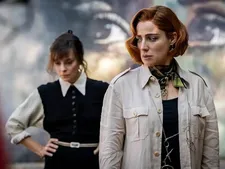 |
| Jasmine Trinca and Luisa Ranieri as the Canova sisters in Diamonds (Diamanti) |
AKT: I noticed a number of little hints at classic movies, for instance An Affair to Remember looms large. Cary Grant, Deborah Kerr, the wheelchair?
FÖ: Ah, yes. It’s funny the way memory works. You see something, then forget about it. That one scene in the wheelchair just came to me, but I hadn’t thought about it at all in the context of the Deborah Kerr film. When I was asked if I made the film as an homage to that I said, yes! But I was lying. In our career as directors we see a lot of movies, we absorb them and then toss them away. I’m thinking for example of Pedro Almodovar’s All About My Mother and All About Eve [directed by Joseph L Mankiewicz]. There are things that we absorb, in my case it was completely unconscious.
AKT: Quoting becomes breathing. Like the two cigarettes from Now, Voyager! Costume design is something I love and that I always pay close attention to. Costume design is at the center of Diamonds; you are also celebrating the craft of costume making. Did you have particular people in mind that are represented by certain roles? The great Milena Canonero perhaps?
FÖ: There are certain costume designers I was thinking of, Milena Canonero yes. Piero Tosi who was a good friend, was not interested when Kubrick approached him about Barry Lyndon and handed it over to Milena, who won the Oscar for it. What I admire so much in these costume designers, also Gabriella Pescucci, Maurizio Millenotti, many of them, who can seem so bossy, is that they are maniacs about detail, maniacs about colour, maniacs about light.
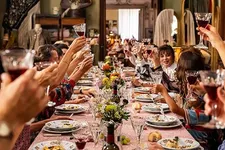 |
| Ferzan Özpetek’s film celebrates large gatherings with food |
AKT: The attention to detail is never wasted. It always shows on the screen how much care was given to the costumes.
FÖ: I was very fortunate to have a very young costume designer to work on this film with me, Stefano Ciammitti, who is going to have a great career ahead of him. One of the greatest designers of all time I think is Balenciaga.
AKT: Cristóbal, I agree!
FÖ: Very discreet at one point, closed his studio. Then it was reopened. Really fantastic, he invented fabric. I said to Stefano, let’s look to him for ideas.
AKT: You even say that one of the sisters [Luisa Ranieri as Alberta] had worked for Balenciaga in Paris as a background story!
FÖ: Yes, exactly.
AKT: The film makes some great points about what clothing means. The girl who hides in the atelier and discovers her new talent speaks about a dress “increasing the space” between people by adding layers. That women “get fat in order to have distance” to protect themselves better from the world.
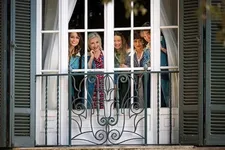 |
| Ferzan Özpetek on his actresses: ” I started to think about it ten years ago to make a film with only women, with my actresses …” |
FÖ: Yes! I mean, this film has been a huge success in Italy. Friends are calling me from Catania and Milan, saying at the end of the film people stood up and applauded as if they were in a theater and that’s something that never happened to me before. On the one hand I’m very happy, of course, but it also gives me a strange feeling.
I was speaking to various audiences and in one case, a woman stood up and she said how did you know that putting on fat was a way to distance someone? In my case, she said, my psychoanalyst helped me to understand that I was putting on weight in order to take distance from my husband. It just came to me spontaneously, because we all have distancing mechanisms and of course a costume designer or a seamstress would use fabric to do that.
AKT: We dress with multiple functions in mind.
FÖ: But I also like the fact that the girl that is found there in the studio is a hidden talent. People with talents they are not aware of until they get to show them. We have no idea how many artists, poets, writers, costume designers, filmmakers, actors have that talent and don’t even know it. So I like the idea of this girl who surreptitiously enters the atelier and they discover her.
I have to say, my films have always done well in Italy but the success of this is just astounding. Instantly 43 countries picked up the rights and I just heard it’s 60 countries at this point. When I’ve gone to show the film in Miami, in Spain, in Argentina, the public has always reacted in the same way. I feel very lucky to have distribution in America.
AKT: There are some funny moments, I am thinking of the running gag that the husband “went to get cigarettes.” And then Fausta [Geppi Cucciari] says “I love men who smoke.” It’s a code that the audience is in on, and we so very much want the torture for Nicoletta [Milena Mancini] to be over. It’s a very serious situation and at the same time you make it funny.
FÖ: The actors, Milena and Vinicio [Marchioni as Bruno] who are playing the couple are married in real life.
AKT: Oh, that adds an extra layer!
FÖ: But in real life it’s the opposite of what you see in the film. I was with them in Thailand and she’s the boss. It’s funny, I decided to sort of reverse their roles, but I was showing the film in Naples, and a girl asked, was that the only way to get rid of a husband? To kill them? I said, no, no, if he’s trying to kill you, then you kill him. But it’s not a question of male or female. If your partner is trying to kill you, then maybe, but it’s certainly not the go-to solution. The male characters in the film are very feminine in a way. For instance in An Affair to Remember, which we talked about, he is renouncing something for this great love to her, which is in a way a very female gesture.
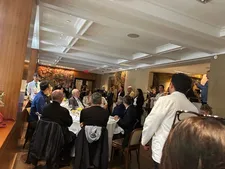 |
| Open Roads: New Italian Cinema luncheon at The Leopard at des Artistes |
AKT: Well, Jasmine Trinca [as Gabriella] has a husband who cares for her.
FÖ: Every man in the film is a very good character. But one is not.
AKT: So he goes in the well! The little marble with the red fish is yours, isn’t it?
FÖ: It’s mine!
AKT: It had to be! What’s the story behind it?
FÖ: One person gave it to me 40 years ago and it’s my good-luck charm.
AKT: Do you have it with you?
FÖ: Not here. But I have this one! [Ferzan shows me one and then another little trinket he carries with him.] One day I was going to the bakery and this woman who had seen the film came up to me, shouting, you made a fantastic film, and she gave me this! I always had my fans but here I conquered a new audience of men. They are passing me and are saying, you made a masterpiece, you are a real genius. So it’s always a great pleasure to attract a new audience.
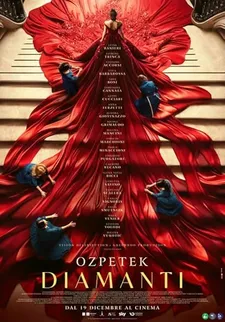 |
| Diamanti poster |
AKT: You dedicate this film to three [dead] actresses whom you say you are going to work with. So I am wishing you good luck with Monica Vitti, Virna Lisi and Mariangela Melato! In connection to the retrospective, I want to ask you about your favourite Monica Vitti movie? Is it your upcoming one?
FÖ: Monica Vitti is mythical for me! My story with Monica Vitti is when my first film came out, which was a big success in Italy, The Turkish Bath it’s called here, and I received the Golden Globe in Italy for that. I went to Cinecittà to pick it up and as I was arriving, Monica Vitti was leaving, accompanied by someone else, who was a French journalist.
And he said, Monica, this is the director of that film you saw the other day, that you liked so much. And she said, congratulations! And she started to leave. But in my head in a way I wanted more. And as if she sensed that, she turned around and came back to me and said, you are going to make a lot of beautiful films! So it’s a very special memory for me.
AKT: And you are still hoping to somewhere film with her because cinema is a magical place?
FÖ: Yes absolutely!
AKT: Thank you so much!
FÖ: I want you to know that I am very happy with your questions because they show how carefully you prepare and how attentive you are when you see a film. You are the only one!
AKT: Thank you for that!








